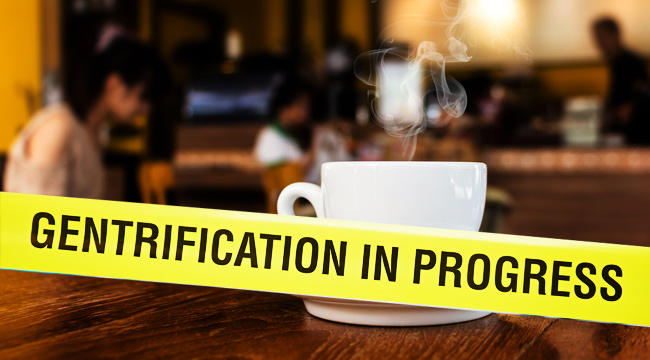
Weird Wave coffee shop’s first day in business didn’t go well. On Instagram, one of the owners of Los Angeles’ newest coffeeshop — located in Boyle heights — wrote that he’d forgotten his keys in his other pants. And the water pump sprung a leak. Then, the author continues in a gleeful sing-song, the protesters showed up and started calling names.
https://www.instagram.com/p/BVX_ws3Dz2C/?taken-by=weirdwavecoffeebrewers
“Then the cops came and everything got crazy,” the caption reads. “Then the plumber showed up at the same time! However a few local shops and friends stood up for us and the protesters left, and the plumber fixed the leak.”
The post ends with a jovial #seeyoutomorrow that can be interpreted in one of two ways: Some might see the hashtag as plucky and undefeated, a new small business trying to stay chipper in the face of adversity; others, however, especially residents of Boyle Heights fighting against gentrification, see it as a threat, another aching reminder that the coffee shop doesn’t belong.
In the week that that coffee shop’s been open, things haven’t gotten better. Protesters have lined up in front of the store and taken their anger out on Weird Wave’s social media accounts. The store’s owners, John Schwartz, Mario Chavarria, and Jackson Defa have responded by calling the cops and making flip comments on Instagram.
One photo, which captures both the storefront and a protest banner, invites people to come down and “join the #party.” On another photo, Chavarria went off on people protesting by demanding that they cut it out and buy a cup of coffee.
Today, the account posted a picture of a protester handing out leaflets. “Expecting excitement all weekend here,” the caption proclaimed cheerily.
https://www.instagram.com/p/BVZ-dtuj7zB/?taken-by=weirdwavecoffeebrewers
The issue of gentrification is a complicated one, and has sparked conversations across the nation. On one hand, it seems that people should be free to move about the country — starting businesses and homes wherever they want. On the flip side, when locally-owned businesses and renters get priced out of urban neighborhoods, one can’t help but recognize the long-term effects of practices like redlining and how they have crippled the home-buying power of minorities over the long term.
In this case, activist groups believe that Schwartz, Chavarria, and Defa are ignoring, per Eater, that coffee shops are often the first sign of gentrification in many American cities. It’s not the coffee itself that the protesters hate, and not even the people running the business, but what the shop’s opening actually signifies: the likelihood that the neighborhood will soon become a hotspot for hip new places, quickly raising rents and displacing the residents — mostly people of color — who have spent their entire lives in the neighborhood. As more and more people around the country begin to lose their homes and businesses to gentrification, the argument of “well, America’s a capitalist society” also becomes more and more difficult to swallow.
This isn’t the first time Boyle Heights has banded together to drive out a business the residents saw as harmful. Last year, Vice reports, the community effectively shuttered PSSST, an art gallery that they saw as “artwashing” the neighborhood. Jere again, the assertion was that art was the first step to raising rents that would push out local renters.
The handling of the whole situation by Weird Wave seems to be making things worse. The company has cultivated a flip attitude on social media — a presence which they promise is awkward rather than malicious, but it feels like the latter would be preferable to the former. They also don’t seem to have done the legwork to really connect with the community.
Other protesters I spoke with pointed to perceived microaggressions by Weird Wave as a key component in pissing off the locals. Weird Wave gave its blessing for Daper, a member of the OTR graffiti crew, to give the alley walls an art-bombing makeover. While granting a Latinx artist permission to paint the side of its shop might have been regarded as an olive branch in calmer times, the murals put up sans-permit, in broad daylight, are seen by many of Weird Wave’s detractors as an example of its white privilege. Furthermore, they’re salt in the wounds of a community still grieving Jesse Romero, a 14-year-old boy slain by the LAPD in August 2016, after being caught graffiti tagging (police claim Romero fired a gun at them before he was killed).
The owners of Weird Wave told Vice that protesters refuse to engage in dialogue, even though they’ve made themselves open to discussion. For now, protesters are still out in force and customers who walk into the store have been said to be treated like those crossing a picket line. Protesters don’t seem to care about concessions — they want the store out. Period.
In strongly worded statements on Facebook, Defend Boyle Heights, an anti-gentrification coalition, has made it clear that gentrification is a reality that will not be tolerated. Because the consequences are always the same: people of color being displaced while their community is taken over by outsiders who are whiter, richer, and excited about the possibility of living in a neighborhood that’s funky and unique while ignoring the fact that the people who made it that way can no longer afford to live there.
“Look at Highland Park. Look at Echo Park. Look at Silver Lake,” one statement reads, invoking the names of other LA neighborhoods that have been gentrified. “And look at Boyle Heights. What do those boulevards have in common? It is wilful[sic] ignorance to not see the very real pattern.”






